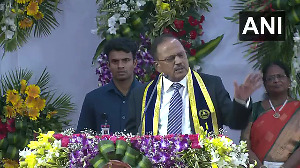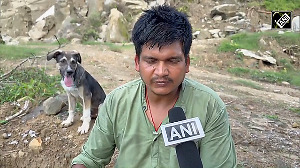 While dowry has long been seen as a despicable social custom responsible for the killing of women in India, a New York historian has traced the phenomenon to influences of the British colonial period.
While dowry has long been seen as a despicable social custom responsible for the killing of women in India, a New York historian has traced the phenomenon to influences of the British colonial period.
In her book, Dowry Murder: The Imperial Origins of a Cultural Crime, Veena Talwar Oldenburg argues that laws effected by the British, while on the one hand brought economic upheaval, on the other they transformed what was till then a safety net for women into a pathology.
Her interest in dowry was spurred partly by questions from the American media and partly her own experience of three decades ago. "There is so much social history that could be written instead of just taking snapshots of today and saying this is what happened," she says. One newspaper in India went on to define dowry as demands made by the groom at the time of marriage, she points out. "If that is dowry, then you really stood it on its head."
Dowry used to be voluntary gifts given by the bride's parents, kin and sometimes the whole village at the time of marriage, she explains. It was reciprocal. Under British rule, a masculine economy took shape and women's control of the system diminished. Boys became even more desirable.
Oldenburg, professor of history at Baruch College and the Graduate Center at the City University of New York, is spending a year in India researching a new book. She is a senior National Endowment for the Humanities fellow of the American Institute of Indian Studies. On a brief visit to New York recently, she released her book at the Asia Society and spoke to rediff.com Senior Correspondent Monika Joshi.
How did you get interested in this subject?
First, it came from the media as a question to me. As a professor, I had no honest answer. That bothered me. I was going to India so I thought I would look it up; I would talk to my feminist friends.
In the sixth chapter of the book, I suggest I have had a personal experience. I was married in 1965, and in 10 months, ended that marriage. It was a marriage by arrangement, and it had nothing to do with dowry. I have mentioned the one little moment when dowry did come up. They asked my parents for an extra set of jewelry. It was given; it should not have been given. But that's not what went wrong, for which I nearly got killed. I tell that story in the last chapter. That it is a very curious case of sexual harassment from a father-in-law; it resulted in a very dramatic event.
I went to Saheli (a women's community organisation in New Delhi) and sat there for a year, every single day. I would listen to the stories of women who came there. They would say -- 'Didi, here's my dowry list. I have already filled the form. Please get back my dowry.' Very cursory, edited, tight and repetitive stories about dowry. I started to meet these people outside Saheli. (Oldenburg discovered that dowry was not the only thing wrong with these marriages.) I have given some of those cases -- love affairs, drinking problems, wife-beating. It seemed the whole universe of sexual jealousy, crimes of passion, other things which happened all over the world seemed not to be happening in India. We had a cultural crime on our hands.
This led me to investigate the universe of cultural crime. There is nothing in the Vedas, the Ramayana, the Mahabharata, the shastras, that say kill your wife if she doesn't bring you dowry.
How did dowry get absorbed into Indian culture?
Culture grows out of pressure from the political. If you think of culture as frozen and static, then we are barking up the wrong tree. But if you look at the idea of culture as dynamic and reconstituting itself with social and economic pressures, then we can start to think of what happened. So I looked at the colonial period. And plenty happened that changed the idea of dowry.
The reason I am not saying it was the same from Manu to pre-colonial times is because there is very little place to find it. What I found was descriptions of what it was just before the British took over, and what it became. I am only talking about that juncture.
The colonial construction of women looked like they were helping women. What I argue is they made it worse. I talk about the collusion of Punjabi patriarchy with colonial patriarchy, creating an even more hidebound structure of rights, or the absence of rights, of women.
How did it happen in a country like India, where we worship the goddess, or Shakti?
In the Punjab (where Oldenburg's research is based), they worship Lakshmi, Durga and Saraswati. But the construction of women over time has declined. We still have those strengths, but the political economy has become so masculine that the place of women in society has shrunk. I have been able to explain the changes that occurred in the colonial period -- very deeply documented. The time you would think that some progress was made, I am arguing for the opposite. There seems to be a loss of women's rights in the use of land.
How did the colonialists effect these changes?
They brought in the notion of private property rights in land, and replaced communal or joint rights. That's the key. Land becomes alienable, as property is. Earlier, you just defended land. For instance, there is a flood in Bihar. People move. They become landless.
But you didn't go into the market and say 'I have got two acres. You give me cash.' Not till you had a title to the land. The British gave titles to the tillers, and land became a commodity. Women did not get titles to the land.
That's why I said property rights and the alienability of land is possibly the greatest social revolution that the British brought, far greater than banning sati. We keep banning things. We learnt from them. Dowry ban kar do. What big difference does that make?
What was the role of the ongoing reform movements?
The reform movements about dowry were (brought in by) the Brahma Samaj and the Arya Samaj. I have written about that. The fact is that the reform movements are there. People are concerned about social things. Even caste. Our Constitution abolished caste and banned it. But the reality is rather different. Isn't it?
Look at the racism in this country (the USA). There was a war about it in 1862. Everyone became equal in the constitution in 1774. Do you think there is no racism here? It's writ on people's skins. Just as gender is writ in the person. That's why gender and race are such fundamental categories. That is why you really need to study them.
No history of India is complete without recognizing the connection between gender and the political economy. That's what I have tried to do. That's why you might start on dowry and end up with the revenue system and customary laws. In the last chapter, I come back and connect it all up to the current situation.
Where do we stand today with respect to dowry?
Dowry has grown with inflation, availability of a larger number of consumer goods, and with women's rights and property, which they don't get. When you are a young woman today, educated; and you will find a lot of this is happening among the educated, middle classes; you say -- I should take my microwave, my refrigerator. Because they know these things are costly and these will be paid for at a time when parents do give. In many cases, the bride may know the boy a bit -- in the urban scene. The boy might say -- well, it will be very nice if I can get a scooter, I can go to office easily. Often, it's negotiable. Yeh nahin diya to woh de diya (if you don't give this, you give that)
In a few cases, which are very unfortunate, and certainly not within the framework of traditional dowry, is the demand, which I call extortion. There is no understanding that you have to yield to the demands, but they find the moment of blackmail. Cards have gone out, the baraat house has been fixed, half the payments have been made. At that point no one wants to withdraw from an arranged marriage. You can only do this if gender relations allow the man to exert a sort of superior idea. What I am saying is -- pay attention to gender relations. Don't condemn the institution of dowry, which has only become a pathology because of gender relations.
Why didn't dowry go the other way? Because there is an implicit subordination of bride-givers to bride-takers because the bride is a woman. It's about being a woman and it is about the legal and social construction of women.
You have discussed female infanticide in the book...
(About this) The colonialists talked to native informants who did not want blame to be put on anyone less than a caste -- a whole caste. Because the minute you blame a caste, you cannot have individual punishment. (For instance) You cannot round up all the banias and put them in jail. It served the British people very well -- to say these people are benighted, they have a horrible culture, and we have come to civilize them. And then Parliament says to civilize anyone s a good deed. As long as you are civilizing them, you are on a good job. But just don't do it for greed. So greed gets disguised as a civilizing mission. I have written about that.
Where does the notion of 'cultural crime' come from?
There are murders in this (American) society also. There is no dowry. 2.5 million women were assaulted by their intimates in 1999. I get this from The New York Times, but never made it to the front page.
Burning rings bells in your brain. Suddenly, it's cultural -- Hindu, fire, cremations, sati are pre-associated with it. You get the whole culture laid out. However, it (burning) is the simplest crime. It's a kitchen crime. You have a tin of kerosene, you have a match. When you burn a woman, you won't find any fingerprints, any kind of tell-tale signs of whether she died in an accident, suicide or murder.
You grew up in Lucknow. What images of women did you see around yourself?
It was a very peculiar time. Partition was still very raw for the Punjabis, Sindhis and Bengalis. A lot of my family, my mother's side and my grandmother's side were from the Punjab. One heard of the horror. Everyone would say things like -- 'I had this necklace I hid it. And then when I came here, I could buy a house.' Dowry was a very positive thing -- the one thing you could leave your country with. My readings of dowry have also been different. People who have forgotten that tend to see dowry as a demand. They don't understand how useful it could be from a woman's perspective. You lose your husband, or you have to leave him.
I certainly don't condone dowry demand, this modern, ugly pathology of dowry. But the custom I condone because it was created at a time because that was all women could get. Today, I am a fighter for women's property rights. Because we lost our rights, and now we are fighting for them again.
Your next book will be set in Lucknow...
My first work, The Making of Colonial Lucknow, was published by Princeton. I listed colonial urban policy and the effects of the mutiny on urban space in Lucknow. I am going back to Awadh. I am looking at the role of the East India Company -- how they displaced sovereign states by condemning the rulers. Wajid Ali Shah was called a debauch. I haven't found a good enough treatment of it.






